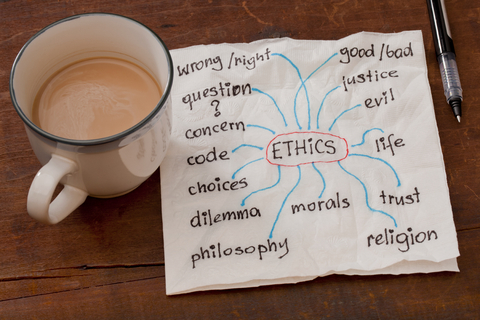
How Your Boss's Ethics Can Hurt Your Career (Op-Ed)

Takuya Sawaoka, a PhD student in the Department of Psychology at Stanford University, contributed this article to Live Science's Expert Voices: Op-Ed & Insights.
Professionals may believe they can maintain an ethical reputation by merely refraining from morally questionable practices: Don't steal, cheat, or bully others. But this alone is not enough. If a higher-up in your organization is found guilty of unethical behavior, your reputation can become tainted merely because you work at the same place.
Take Enron. The fraudulent business dealings of top executives led to one of the biggest scandals of the decade. Rank-and-file employees lost their jobs, health care and life savings. But on top of all that, many were confronted with another consequence of the scandal: The public perception that any person involved with Enron was corrupt and dishonest, hurting their prospects at future employment. Despite the fact that it was a handful of top executives who were responsible for the corruption, everyone employed at Enron suffered reputation damage as a result — even employees who played no part in the fraudulent behavior that brought the company crashing into bankruptcy. [Science of Scandal: Why Politicians Bounce Back]
Ethical scandals are not limited to the business world. Psychologist Diederik Stapel was a star among his academic colleagues, until he was found responsible for academic fraud in 2012. Stapel had fabricated data for dozens of scientific papers. University investigators concluded that Stapel worked alone, thereby clearing the names of his collaborators and students, many of whom promptly retracted papers that included any data supplied by Stapel. And yet despite these precautions, could their mere association with Stapel's name dampen their future prospects with a cloud of suspicion?
More broadly, how does one person's unethical behavior contaminate the reputations of their colleagues and subordinates?
In new research in press at Social Psychological and Personality Science, which I conducted with my co-author at Stanford University, Benoît Monin, we examined those questions.
We noticed that in many publicized scandals, the people implicated in the corruption are often powerful, high-status executives. Unethical behavior can be committed by less-powerful people, such as when lower-level employees are accused of skimming, but in those cases, organizations — and other employees — do not seem to suffer as much reputational damage.
Based on that observation, we speculated that the social status of a corrupt individual plays a key role in determining how much reputational damage their colleagues subsequently suffer. We predicted that when high-status individuals engage in fraudulent behavior, as was the case with Enron executives and with Diederik Stapel, fellow organization members come under greater suspicion than when lower-status individuals are exposed. In other words, the fallout from scandals involving higher-status executives is particularly likely to trickle down and to contaminate the reputations of their colleagues.
Moral reputations trickle down
In one of our experiments, we investigated how unethical behavior by upper management affects the career prospects of other organization members. We recruited participants to read about a scandal in which an organization member was guilty of fraud. We manipulated whether the transgressor was described as a "high-ranking executive" or an "entry-level employee."
Afterwards, we asked participants to make a hiring recommendation for another employee who simply happened to work at the same organization. We found that people made significantly more negative hiring recommendations for this employee after they read that a high-ranking executive (rather than an entry-level employee) from this organization had committed fraud — even though there was no indication that the two had ever worked together or even knew each other.
Why are the ethical failures of upper management so much more damaging for the reputations of their organizations? Our research suggests that people perceive high-ranking organization members, such as CEOs or team leaders, to be prototypical — in other words, they're seen as embodying the qualities and characteristics of the rest of the organization. As a result, people assume that if the leader is corrupt, then the organization must be corrupt, and therefore all other employees must be corrupt as well.
This spells bad news for people who work in organizations with unethical leaders. Even if you are an outstanding moral employee, the ethical missteps of those above you can damage your own reputation. In order to protect your image in the eyes of others, it may not be enough to be ethical yourself — it's also important to surround yourself with ethical co-workers, and particularly to work under ethical management.
What to do when scandal strikes
Of course, there is only so much control you have over the ethical behaviors of your colleagues. If some employees at your organization become embroiled in scandal, what can you do to protect your organization's, and thus your own, reputation?

One strategy would be to downplay the social status of the transgressor. If people perceive the corrupt organization member to be lower-status, this will reduce the reputational damage inflicted on the rest of the organization. If this approach is not possible (in the case of unambiguously high-status transgressors, like a CEO), another strategy would be to emphasize the ways in which the corrupt organization member is not representative of the organization, such as by describing the ways in which his or her actions reflect personal flaws rather than the organization's values more broadly.
Another intriguing implication is that although leaders are often encouraged to take responsibility for ethical breaches in their organization, this approach could potentially backfire. According to conventional wisdom, if top management takes responsibility for misdeeds by middle management, this may prevent reputational damage from spreading to subordinates. However, our research suggests that the opposite may be true: If top management takes responsibility, the corruption could be perceived as representative of the organization as a whole, expanding the spread of reputational damage and ultimately hurting more organization members.
Reputations are interconnected
Perhaps now more than ever, people's professional networks are readily available for all to see. With the rise of ubiquitous online social networks, rapid news cycles, and greater information transparency, details regarding your professional affiliations — organizations and people you've worked with, for example — are only a few clicks away. In addition, revelations about co-workers' ethical lapses spread quickly on the Internet gossip mill. The processes Monin and I document are thus likely to be exacerbated and accelerated in this new information age.
Our research highlights how being associated with unethical supervisors and companies can contaminate your own reputation, damaging your future career prospects. In this way, our reputations are all interconnected — which is why it's in our own best interest to work for ethical management and organizations.
Follow all of the Expert Voices issues and debates — and become part of the discussion — on Facebook, Twitter and Google+. The views expressed are those of the author and do not necessarily reflect the views of the publisher. This version of the article was originally published on Live Science.
Sign up for the Live Science daily newsletter now
Get the world’s most fascinating discoveries delivered straight to your inbox.
Why is yawning contagious?
Scientific consensus shows race is a human invention, not biological reality










